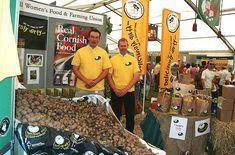
This year the Cornish Early campaign has seen an even more refreshed focus with joint co-ordinators Taste of the West (TOW) and the Penwith Farm Bureau (PFB), lending some financial support to the promotion headed by the slogan “Deliciously Dirty”.
“It was a modest campaign in 2003 but it provided a strong foundation,” says PFB adviser, John Forster. “But by starting to bring a fresh, excellently tasting product to consumers’ notice, it stretched the boundaries of their imagination.”
Angie Coombs of TOW agrees the campaign has had a developing level of success since it started. “The initial objectives were to stabilise the market for Cornish Earlies to create an opportunity for the growers to retain a good price for a maximum of six weeks before the new potato market is flooded by Jersey Royals and other varieties.” The initiative is implemented and supported by some 18 Cornish potato growers located in the south west, around Marazion, on the ‘Golden Mile’ from Penwith to Land’s End.
Forster believes the groundwork added further impetus to a good season last year and was instrumental in holding prices in a market which can still be highly volatile because of the effects of weather on both supply and demand. Last winter was a time to evaluate the next step, he says, resulting in producers contributing to an increased budget of £15,000. This has allowed the development of a web site, www.deliciouslydirty.com, and an increased PR campaign including an explanatory booklet, and, for the first time in May, a strong presence at the Royal Cornwall Show. In addition, growers have invested in new 25kg and 12.5kg kraft outlets carrying the Deliciously Dirty slogan.
Coombs says there are signs that all parts of the industry are starting to respond to consumer demand. “Consumer interest over the last two years had been raised and local restaurants were supporting Cornish Earlies but there was a reluctance from the supermarkets. They would take them but not brand them and local wholesalers have been hesitant owing to the impossibility of knowing exactly when they are going to be ready.”
However, one area showing signs of promise is a delivery service, called ‘a man with a van’. Coombs says this service enables trade buyers including small shops and wholesalers, to call a mobile phone number and have potatoes delivered in wholesale quantities as and when they are needed. In addition, Coombs says the campaign is keen to develop the website sales side of the business, which provides consumers with ready-packaged parcels, within 12 hours of picking.
According to Forster, the grower group is now considering how to strengthen its marketing approach to wholesalers, including those from outside the county. But, apart from the additional competition on both volume and price, from other varieties, Forster argues the brand image may be weakened outside of the county, while there is still potential for growth closer to home. “The exercise at the Royal Cornish Show proved to be particularly valuable as it confirmed there was an untapped local market,” he says. “We were amazed that so many people wanted to buy the product but told us it was often unobtainable.”
Meanwhile, Cornish Earlies will be enjoying wider recognition locally this year now that Asda and Somerfield have begun to identify the crop in store. “This has been a great help this season particularly when the whole potato trade has been complicated by the late start,” says Forster.
With the season over for 2005, the group is now weighing up its options for next year, which Forster hints could be related to building a stronger marketing platform with an emphasis on premium pricing. Several producers believe that their Cornish reputation could ultimately elevate their product to the same awareness as Jersey, he says. With a marketing budget of £20,000 compared to the £1.5million spent by Jersey, Cornish Earlies still have a way to go before they reach the same heights, says Coombs. However, she says she has recently been approached by the organisers of their campaign, who have showed an interest in sharing some ideas for best practice.
The drive for progress could lead to the rationalisation of the number of varieties grown, and be seen as another way to standardise quality, Forster and Coombs suggest. “I would like to see the number of varieties stream-lined to two or three rather than six or seven for better control over the seeding, to get the varieties which are most appreciated and produce the best crops,” says Coombs. This process would also help to ensure better quality control, she claims. “This is a niche market product and it needs to be marketed in that respect. It is important that the size and quality of a potato lifted in Penzance, Bodmin or Oakhampton is the same.”



